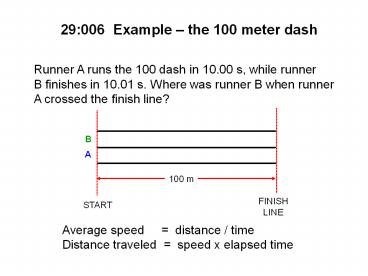29:006 - PowerPoint PPT Presentation
Title:
29:006
Description:
A crossed the finish line? FINISH. LINE. A. B. 100 m. START ... when A crosses the finish line, B has run a distance of xB = 9.99 m/s x 10.00 s = 99.90 m ... – PowerPoint PPT presentation
Number of Views:498
Avg rating:3.0/5.0
Title: 29:006
1
29006 Example the 100 meter dash
Runner A runs the 100 dash in 10.00 s, while
runner B finishes in 10.01 s. Where was runner B
when runner A crossed the finish line?
B
A
100 m
FINISH LINE
START
Average speed distance / time Distance
traveled speed x elapsed time
2
SOLUTION
- average speed of A vA 100 m/10.00 s 10.00
m/s - average speed of B vB 100 m/10.01 s 9.99
m/s - when A crosses the finish line, B has run a
distance of xB 9.99 m/s x 10.00 s 99.90 m - B is 100.00 m 99.90 m 0.10 m behind A(10
centimeters, or about 4 inches) - The world record is 9.76 s. (runner A would be
2.4 meters behind the world record holder)
3
29006 The Physics of Everyday Experience
How Things Work
- Science is a part of everyday life.
- It is evident in the modern technological devices
we use everyday - In this course we will uncover the scientific
principles in the everyday experiences and
objects around us - We will see that what seems like magical
effects can be understood with just a few basic
principles ? things happen for a reason!
4
PRIMARY COURSE GOALS
- To learn some of the basic concepts of physics by
studying common, everyday objects and activities - To understand the physical concepts that makes
things work - To participate in science by exploiting our
natural curiosity
5
ADDITIONAL COURSE GOALS
- To appreciate the quantitative nature of physical
science - To learn how to deal with simple formulas to
obtain numerical solutions to problems
6
SOME OF THE QUESTIONS THAT WILL BE EXPLORED IN
THIS COURSE
- Why do things move?
- Does everything that goes up come down?
- Why does a bicycle stay upright when its moving
but falls when it stops? - Why do we wear seatbelts?
7
- Why is it tough to walk on ice?
- Why does ice melt?
- Why doesnt the moon fall?
- What is sound?
- What is light?
- What is lightning?
- What makes rainbows?
- How can a boat made of steel float?
- Why cant we see air, how do weknow that its
there?
8
- Why are some turns on roads banked?
- What keeps me from falling on the Silly Silo at
Adventureland? - Why do my socks sometimes stick together in the
clothes dryer? - Why do I get a shock after I walk across the
carpet room and touch something in winter?
9
- Whats the deal with magnets? Why do they stick
on refrigerators? - By the way how do refrigerators and air
conditioners work? - Why cant I cool my room by keeping the
refrigerator door opened? - Why is it a bad idea to plug my TV, stereo,
computer, radio and hair dryer into the same
outlet?
10
- Where does electricity come from?
- Why doesnt the electricity leak out of the
outlet? - What do airplanes and curveballs have in common?
- Why do my ears pop when Im on a plane ?
- Why can I see all of myself in a mirror that is
half as tall as I am?
11
- How do(es) x-rays, microwaves, ultrasound,
MRIs, LASERS, and cable TV work.? - By the way how does TV work?
- Why does the water in my tub spin in a circle as
it goes down the drain? Why does it always spin
in the same direction? - How does soap work?
- Why is the sky blue during the day but red at
sunset? - Are nuclear power plants safe?
12
- How do they take my temperature by sticking that
gadget into my ear? - Why does the cue ball stop dead when it
hits another ball head on? - What is a day, month, year?
- Why does a year on Jupiter last 12 years?
- Are hydrogen fuel cells or hybrid cars the answer
to the energy crisis? - What does it take to make an atom bomb?
13
What Physics isnt
- Art
- Philosophy
- Engineering
- Religion
- Math
- Astrology
- Magic
- Boring and impossible to understand
- Done only by mad scientists
14
What Physics is
- The study of how objects behave (from the very
tiny to the very big, and from the beginning of
the Universe to its ultimate fate). - A search for patterns or rules of behavior of the
objects in the Universe.
15
Relation of Physics to the other sciences
- Obviously, no one discipline can handle all the
work outlined above, so long ago a division of
labor was set up. This is referred to as
specialization.
16
Specialization in Science
- Astronomy
- Chemistry
- Biology
- Geology
- Oceanography
- Meteorology
Physical inanimate objects
SCIENCE
Biological living things
17
- All matter, living and non-living, is composed of
the same basic ingredients- atoms and molecules - At the most fundamental level the distinction
between living and non-living disappears. - Cleary, however, human behavior cannot be
understood on the basis of either physical or
biological science alone
18
- Sociology
- Psychology
- Political science
- Economics
Social Science is the discipline that
investigates the interrelationships among people
19
The scientific approach
- Progress in understanding our physical
surroundings comes about through observation and
measurement
- Coupled with logic and reason
20
What do I need to do (to geta good grade in this
course)?
- Download the lecture material before class
- Come to class, observe, think, ask questions!
- go over the lecture material
- Keep up with the reading assignments- all from
the text - Work the assigned problems































